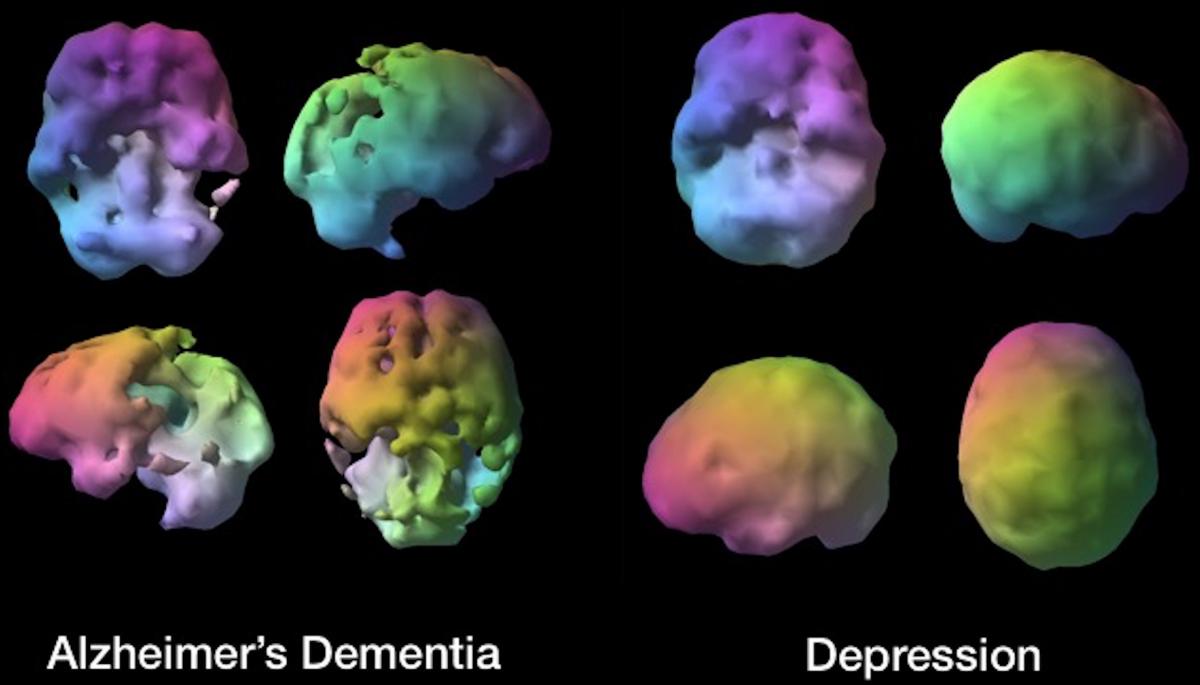15 February 2017

Neuroimaging of decreased blood flow in specific regions of the brain can differentiate between depression and cognitive disorders, according to a new report in the Journal of Alzheimer’s Disease
Amsterdam, NL – Does a patient have depression or a cognitive disorder (CD) such as Alzheimer’s disease or both? Since both disorders have overlapping symptoms, how can a clinician tell them apart to make an appropriate diagnosis? In a new article published in the Journal of Alzheimer’s Disease, researchers have found that single photon emission computed tomography, or SPECT, can help to distinguish between these diagnostic categories.
In one of the largest studies of its kind, 4541 subjects were examined, 847 of whom had been diagnosed with dementia, 3269 with depression, and 425 with both conditions. Using brain SPECT imaging, a nuclear medicine study that measures blood flow and activity, researchers found that people with cognitive disorders had reduced blood flow in multiple brain areas compared to those with depression, particularly in the hippocampus, temporal, and parietal lobes. They also found that SPECT could distinguish depression from CDs with 86% accuracy. In addition, brain SPECT imaging showed the ability to distinguish depression or dementia in people with both with 83% accuracy.

Caption: Representative brain SPECT scans in a patient with Alzheimer’s dementia showing substantially reduced brain blood flow in the temporal and parietal lobes compared to a person with depression with mild decreased frontal lobe blood flow.
“This is a critical clinical question that has practical implications for patient management and treatment,” explained lead researcher and psychiatrist Daniel G. Amen, MD. “These disorders have very different prognoses and treatments and being able to improve diagnostic accuracy can improve outcomes for some patients.”
The authors write, “Cognitive impairment is present in approximately half of persons who have late onset depression and depression is evident in 9-65% of individuals with dementia. Studies have indicated that the prevalence of depression in patients with mild cognitive impairment is 25%. Consequently, it is often challenging to diagnostically disentangle depression and cognitive disorders from one another.”
Traditionally, depression can be diagnosed using tools such as the Beck Depression Inventory. However, there was no statistically significant difference in the burden of depression symptoms on this inventory between persons with both depression and CDs compared to persons with either condition. This increases the difficulty of distinguishing these disorders on the basis of depression symptom severity alone.
"One of the greatest new insights of the past decade is the linkage of depression to the psychology of late life cognitive decline. Raji and coworkers extend the approach to the biological substrate by an elegant imaging approach. These studies further place brain aging on a firm biological basis," added George Perry, PhD, Editor-in-Chief of the Journal of Alzheimer’s Disease and Dean and Professor of Biology University of Texas at San Antonio.
# # #
Contacts:
George Perry, PhD
Editor-in-Chief, Journal of Alzheimer's Disease
Dean and Professor of Biology, The University of Texas at San Antonio
+1 210 458 4450
george.perry@utsa.edu
Diana Murray
IOS Press
+1 718-640-5678
d.murray@iospress.com
www.j-alz.com
NOTES FOR EDITORS
“Classification of Depression, Cognitive Disorders and Co-Morbid Depression and Cognitive Disorders with Perfusion SPECT Neuroimaging,” by Daniel G. Amen, MD, Pavitra Krishnamani, BA, MS, Somayeh Meysami, MD, Andrew Newberg, MD, and Cyrus A. Raji, MD, PhD, DOI: 10.3233/JAD-161232, is published online in advance of the Journal of Alzheimer’s Disease, Volume 57, Issue 1 (March 2017) by IOS Press.
Full text of the paper is available to credentialed journalists upon request; contact Diana Murray at +1 718-640-5678 or d.murray@iospress.com. Journalists who wish to reach the authors for comment should contact Daniel G Amen, MD, at docamen@amenclinics.com.
ABOUT THE JOURNAL OF ALZHEIMER’S DISEASE
The Journal of Alzheimer's Disease (http://www.j-alz.com) is an international multidisciplinary journal to facilitate progress in understanding the etiology, pathogenesis, epidemiology, genetics, behavior, treatment and psychology of Alzheimer's disease. The journal publishes research reports, reviews, short communications, book reviews, and letters-to-the-editor. Groundbreaking research that has appeared in the journal includes novel therapeutic targets, mechanisms of disease and clinical trial outcomes. The Journal of Alzheimer's Disease has an Impact Factor of 3.920 according to Thomson Reuters' 2016 Journal Citation Reports®.
ABOUT IOS PRESS
Celebrating its 30th anniversary, IOS Press (www.iospress.com) is headquartered in Amsterdam with satellite offices in the USA, Germany, India and China and serves the information needs of scientific and medical communities worldwide. IOS Press now publishes over 100 international journals and about 75 book titles each year on subjects ranging from computer sciences and mathematics to medicine and the natural sciences.







